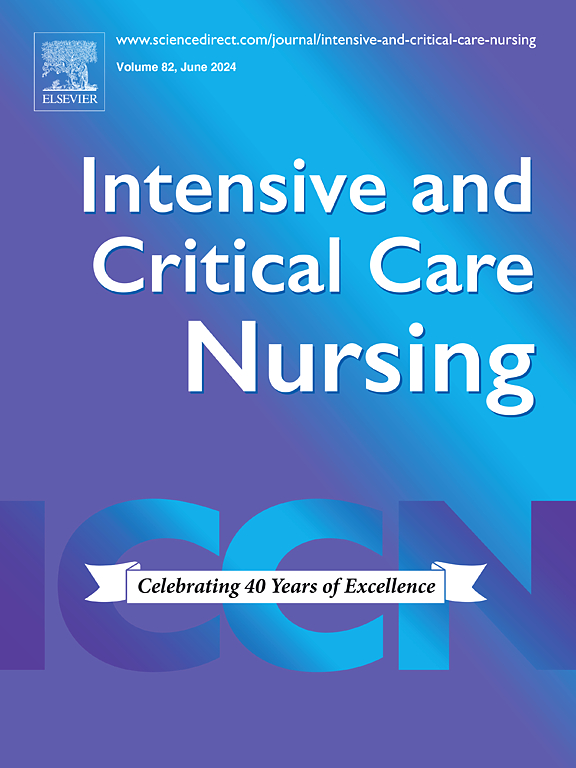Inclusive leadership, self-efficacy, organization-based self-esteem, and intensive care nurses’ job performance: A cross-sectional study using structural equation modeling
IF 4.9
2区 医学
Q1 NURSING
引用次数: 0
Abstract
Background
The job performance of intensive care nurses is critical to the treatment and recovery of critically ill patients. Inclusive leadership, self-efficacy and organization-based self-esteem (OBSE) are important psychosocial factors affecting job performance. However, few studies have explored the relationships among these factors in critical care nurses.
Aims
To examine the impact of inclusive leadership on the job performance of intensive care nurses and to explore the potential mediation through self-efficacy and OBSE.
Methods
A cross-sectional survey design was employed. Between November and December 2023, a total of 460 intensive care nurses from China completed the survey, which included standard assessments on inclusive leadership, self-efficacy, OBSE, and job performance. Mediation analysis was conducted using structural equation modeling. Indirect effects were evaluated through bootstrapping.
Results
The results indicated significant positive correlations among inclusive leadership, self-efficacy, OBSE, and job performance (all P < 0.01). Inclusive leadership not only directly affected the job performance of intensive care nurses but also influenced it through the partial mediating roles of self-efficacy and OBSE, with the mediating effects accounting for 14.29 % and 30.61 % of the total effect, respectively. Additionally, the analysis found that self-efficacy and OBSE played a chain mediating role in the relationship between inclusive leadership and the job performance, with the mediating effect accounting for 22.45 % of the total effect.
Conclusions
Inclusive leadership positively predict the job performance of intensive care nurses. Self-efficacy and OBSE act as mediating factors, further explaining how inclusive leadership improves the job performance of intensive care nurses.
Implications for clinical practice
Enhancing inclusive leadership can be achieved through targeted training programs that emphasize open communication, team collaboration, and recognition of diverse perspectives. For example, leadership workshops can include role-playing scenarios that promote active listening and constructive feedback. Furthermore, boosting self-efficacy and OBSE is essential, as these variables significantly mediate the relationship between inclusive leadership and job performance. Encouraging mentorship and providing opportunities for professional development can help nurses build their confidence and organizational identity, ultimately leading to improved performance and patient care outcomes.
包容性领导、自我效能感、基于组织的自尊和重症监护护士的工作绩效:利用结构方程模型进行的横断面研究。
背景:重症监护护士的工作表现对重症患者的治疗和康复至关重要。包容性领导、自我效能感和基于组织的自尊(OBSE)是影响工作绩效的重要社会心理因素。目的:研究包容性领导对重症监护护士工作绩效的影响,并探讨自我效能感和组织自尊对工作绩效的潜在调节作用:方法:采用横断面调查设计。在 2023 年 11 月至 12 月期间,共有 460 名来自中国的重症监护护士完成了调查,调查内容包括包容性领导力、自我效能感、OBSE 和工作绩效的标准评估。采用结构方程模型进行了中介分析。通过引导分析评估了间接效应:结果表明,全纳领导力、自我效能感、OBSE 和工作绩效之间存在明显的正相关关系(P 均小于 0.01)。包容性领导不仅直接影响重症监护护士的工作绩效,还通过自我效能感和 OBSE 的部分中介作用对其产生影响,中介效应分别占总效应的 14.29 % 和 30.61 %。此外,分析还发现,自我效能感和开放性工作环境在包容性领导与工作绩效的关系中发挥了连锁中介作用,中介效应占总效应的 22.45%:包容性领导能积极预测重症监护护士的工作绩效。结论:包容性领导能积极预测重症监护护士的工作绩效,自我效能感和OBSE是中介因素,进一步解释了包容性领导如何提高重症监护护士的工作绩效:加强包容性领导力可以通过有针对性的培训计划来实现,这些计划强调开放式沟通、团队协作和对不同观点的认可。例如,领导力研讨会可包括角色扮演情景,以促进积极倾听和建设性反馈。此外,提高自我效能感和 OBSE 也很重要,因为这些变量在很大程度上调节着包容性领导与工作绩效之间的关系。鼓励导师制并提供专业发展机会可帮助护士建立自信和组织认同感,最终提高工作绩效和患者护理效果。
本文章由计算机程序翻译,如有差异,请以英文原文为准。
求助全文
约1分钟内获得全文
求助全文
来源期刊

Intensive and Critical Care Nursing
NURSING-
CiteScore
6.30
自引率
15.10%
发文量
144
审稿时长
57 days
期刊介绍:
The aims of Intensive and Critical Care Nursing are to promote excellence of care of critically ill patients by specialist nurses and their professional colleagues; to provide an international and interdisciplinary forum for the publication, dissemination and exchange of research findings, experience and ideas; to develop and enhance the knowledge, skills, attitudes and creative thinking essential to good critical care nursing practice. The journal publishes reviews, updates and feature articles in addition to original papers and significant preliminary communications. Articles may deal with any part of practice including relevant clinical, research, educational, psychological and technological aspects.
 求助内容:
求助内容: 应助结果提醒方式:
应助结果提醒方式:


